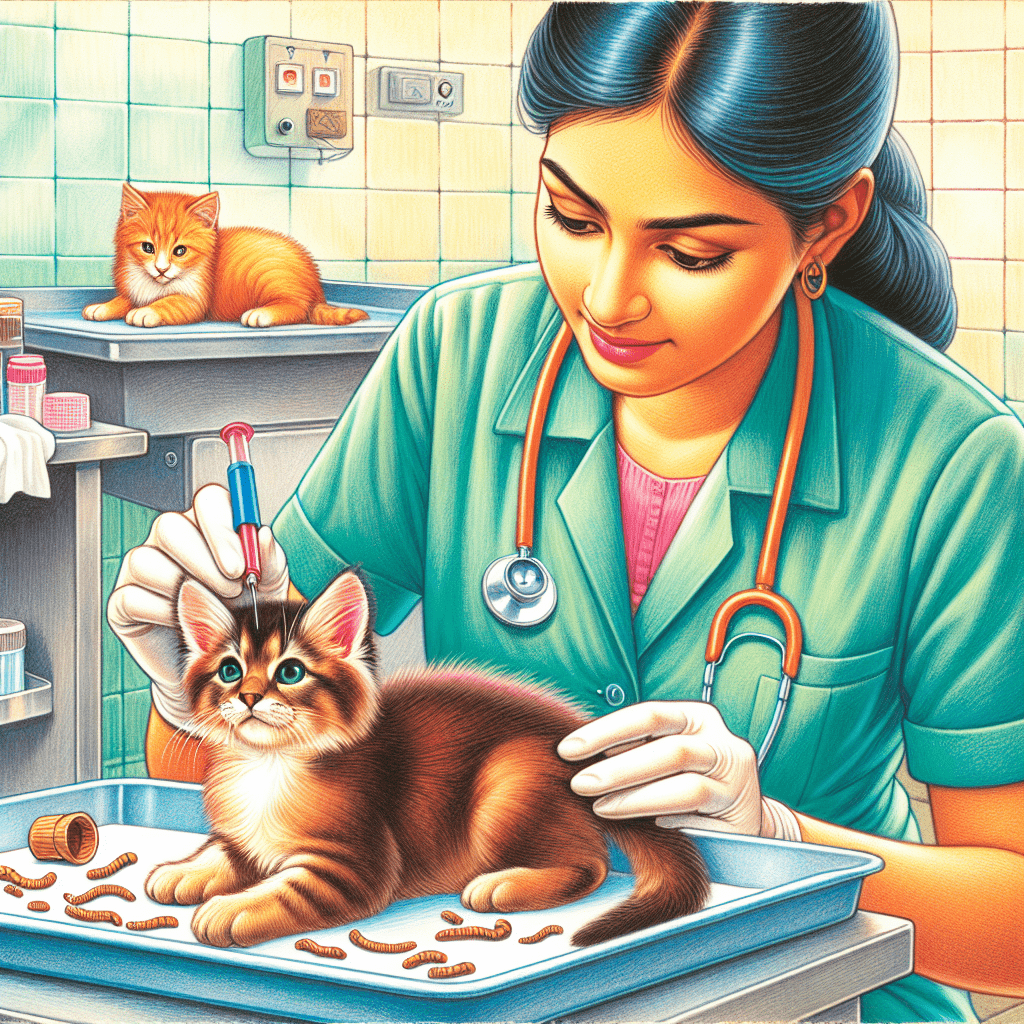Understanding the Importance of Kitten Deworming
Kittens are adorable, curious little beings who are vulnerable to internal parasites. These parasites can significantly impact their health and development. Deworming your kitten isn’t just a one-time thing; it’s a crucial preventive measure to ensure they grow into healthy and happy cats. Common parasites like roundworms, hookworms, and tapeworms often find their way into kittens, leading to serious health issues if not addressed promptly.
Table of Contents
When Can You Deworm a Kitten?
It is essential to start deworming kittens early to ensure their well-being and healthy development. The ideal beginning time is when kittens are around 2 to 3 weeks old. This early intervention helps eliminate parasites they may have contracted from their mother or environment. Subsequent deworming should be performed every two weeks until they reach eight weeks of age. After this initial period, it is advisable to continue deworming at 12 weeks of age and then transition to a monthly schedule. Regular deworming and routine veterinary check-ups form a comprehensive approach to maintaining your kitten’s health.

Initial Deworming
Kittens should be dewormed early, starting at 2 weeks of age. Consult your veterinarian for an appropriate deworming medication. Generally, a broad-spectrum dewormer is used to target various types of worms.
How Often Should You Deworm a Kitten?
The frequency of deworming is pivotal to your kitten’s overall health and development. A more extended schedule can be adopted after the initial deworming sessions at 2 to 3 weeks of age and every two weeks after that until eight weeks. From 12 weeks of age, kittens should be dewormed once a month until they reach six months. After six months, transitioning to a three-monthly deworming schedule is recommended for continued protection against parasites. This consistent approach ensures that parasites do not have the opportunity to mature and cause serious health issues. Always consult your veterinarian to tailor a deworming regimen that best suits your kitten’s needs and environment.
Do Indoor Cats Need Deworming?
Yes, indoor cats do need deworming. While it is true that indoor cats are less exposed to outdoor environments where parasites are more prevalent, they are not entirely immune to the risk of internal parasites. Indoor cats can still contract parasites through various means, such as contacting pests like fleas or rodents, which can carry worm larvae. Additionally, humans can inadvertently bring parasite eggs into the home on their shoes or clothing. Therefore, it is essential to maintain a regular deworming schedule for indoor cats to ensure they remain healthy and free from parasitic infections. Consult your veterinarian for a tailored deworming plan that accommodates your indoor cat’s lifestyle and health needs.
How to Deworm a Kitten
Deworming a kitten is a straightforward process that requires attention to detail and consistency. Follow these steps to ensure the effective administration of deworming medication:
- Consult Your Veterinarian: Before starting any deworming treatment, chat with your vet first. They’ll suggest the best deworming meds and dosages tailored to your kitten’s age, weight, kitten’s health.
- Select the Appropriate Dewormer: Different dewormers exist, such as oral tablets, liquids, and topical treatments. Your vet can help you pick the best one for your kitten.
- Administer the Medication:
- Oral Tablets: If you are using tablet form, gently hold your kitten’s head and openkitten’south. Place the tablet at the back of their tongue and close their mouth, encouraging swallowing by gently stroking their throat.
- Liquid Dewormers: Use a syringe or dropper to measure the correct dose for liquid dewormers. Administer the liquid slowly into the side of the kitten’s mouth to prevent vomiting.
- Topical Treatments: If using a topical treatment, part the fur on the kitten’s neck near the kitten’s skull and apply the medication directly to the skin. Allow it to absorb without letting the kitten lick the area.
- Monitor Your Kitten: Once you’ve given your kitten the dewormer, just watch them for any weird reactions like vomiting, diarrhea, or if they seem a bit tired. If anything seems off, just let your vet know right away.
- Follow-Up Treatments: Deworming is not a one-time event. Adhere to the deworming schedule as recommended and ensure follow-up treatments are administered on time. As part of an overall health plan, regular deworming will significantly reduce the risk of parasite infestation.
- Maintain Hygiene: Keep your kitten’s living area free from feces. Regularly wash bedding, litter trays, and toys to prevent re-infestation.
Following these steps will safeguard your kitten’s health and development by mitigating the risks posed by internal parasites. Always maintain open communication with your veterinarian to adapt the deworming regimen according to your kitten’s evolving need kitten’s to Expect After Deworming a Kitten.
After deworming your kitten, closely monitoring behavior and health to ensure a successful outcome is important. Here are a few things you might expect:
Immediate Reactions
Your kitten may show no immediate reaction, or they might display minor symptoms such as mild lethargy or a temporary loss of appetite. These reactions are generally short-lived and should not cause alarm. Ensure your kitten stays hydrated and comfortable during this period.
Passing Worms
It is common for kittens to expel worms in their feces shortly after treatment. You may observe dead worms or worm segments in the litter box. This indicates that the deworming medication works effectively to eliminate the parasites.
Changes in Stool
The kitten’s stool might be a kitten’s or softer than usual for a short period after deworming. This change is typically temporary and should resolve within a day or two. Keep an eye on the consistency of the stool and consult your veterinarian if diarrhea persists.
Increased Activity and Appetite
As the parasitic burden decreases, you might notice an increase in your kitten’s energy levels. A parasitic infection can cause lethargy and reduced appetite, so seeing an improvement is a positive sign.
Follow-Up Care
Schedule any follow-up treatments as recommended by your veterinarian. Consistent and timely administration of deworming medication is crucial to ensure all parasites are eradicated and to prevent re-infestation.
By keeping these expectations in mind, you can effectively manage your kitten’s post-deworming kitten’s and ensure they remain on the path to healthy growth. Always communicate openly with your veterinarian for any concerns or questions during this period.
How Long Does It Take for Kitten Dewormed to Work?
When it comes to how long it takes for kitten dewormer to kick in, it can vary based on a few things, like the type of medication you’re using and how bad the worm situation is. Usually, you’ll start seeing results in a few hours to a few days. Oral dewormers like tablets and liquids typically get to work pretty quickly, and you might notice worms coming out in your kitten’s poop not long after. Topical treatments take longer to show results but do a great job of getting rid of those pesky parasites.
It’s super important to follow your vet’s instructions to ensure the treatment does its job well. Most dewormers need a follow-up dose after a couple of weeks to treat baby worms that might appear after the first round. Keeping an eye on things and sticking to your vet’s deworming schedule is critical to getting rid of the worms and ensuring they don’t return. If you’re worried about how well the treatment works or if your kitten is still showing signs of worms, chat with your vet.
How Much Does Kitten Dewormer Cost?
Hey there! Regarding kitten dewormers, the cost can vary based on a few things, like the type, brand, and where you get it. You’ll find over-the-counter meds ranging from $10 to $30. However, prices may shift depending on whether you pick tablets, liquids, or topical treatments. Opt for prescription dewormers from your vet. They might be a tad pricier but are tailored for specific parasites, so they work better.
The initial deworming cost is pretty essential for your kitten’s health. Remember to factor in follow-up treatments and vet visits, especially for serious cases or if your kitten doesn’t react well. Keeping up with regular deworming as part of your vet care routine is critical to keeping your kitten healthy and free of parasites, which can save you on potential health costs down the line. Remember to chat with your vet to figure out the best and most budget-friendly deworming plan for your little one!

How to Check for Kitten Parasites
Early detection of parasitic infections in kittens is crucial for prompt treatment and overall health maintenance. Here’s a step-by-step guide to help you check for common parasites:
- Observe Physical Symptoms: Look for visible signs indicating a parasitic infection. Common symptoms include a distended abdomen, dull coat, weight loss, diarrhea, and vomiting. Kittens may also exhibit a lack of energy and appetite.
- Inspect FHere’s. Regularly When you check your kitten’s poop, keep an eye out for anything unusual. Finding worms, blood, or mucus in their stool could mean they have internal parasites like roundworms, tapeworms, or hookworms.
- Examine the Fur and Skin: Thoroughly check your kitten’s fur and skin for signs of external parasites like fleas or mites. Use a kitten’s soothed comb to part the fur and look for small, dark specks (flea dirt) or crawling insects on the skin’s surface. Pay close attention to the tail’s base and the neck’s back.
- Monitor Behavior: Note any significant behavior. Scratching or biting at the skin excessively can indicate external parasites. In contrast, lethargy and a decreased interest in play may indicate internal parasites.
- Feel the Askins: Gently palpate your kitten’s abdomen for unusual swelling or hardness, which could suggest the presence of worms.
- Collect a Stool Sample: To obtain a conclusive diagnosis, obtain a recent stool sample and have your veterinarian conduct a microscopic examination. This crucial step aids in pinpointing the exact type of internal parasite and the kitten’s selection of the most suitable treatment plan.
- Regular Veterinary Check-Ups: Schedule regular veterinary examinations, during which your vet will conduct routine checks for parasites. Early detection through professional veterinary inspection ensures timely intervention and better health outcomes.
Following these steps, you can monitor your kitten for pesky parasites and get treatment if needed. Do regular checks and stick to a deworming schedule to keep your kitten healthy and growing. And remember, always chat with your vet for personalized advice and treatment options!
Common Parasites in Kittens
Roundworms
Roundworms are like the annoying squatters of a kitten’s tummy. They sneak in from the momma cat through the placenta or milk. Watch for signs like a chubby tummy, puking, runny poop, and shedding kitten’s Hookworms
Hookworms latch onto the intestinal lining and snack on the kitten’s blood, leading to anemia, weakness, and feeling sluggish. Kittens can pick up hookworms by swallowing larvae or entering into direct skin contact.
Tapeworms
Tapeworms are usually passed on when your kitten eats fleas that are infected. This can lead to weight loss and irritation near the bottom. You might even spot tapeworms kitten’s in your kitten’s poop or around their rear end.
Kitten Deworming Schedule
A precise deworming schedule is critical for your kitten’s health. Here’s a recommended schedule that veterinarians typically follow:
Initial Deworming (2-3 Weeks Old)
Kittens should receive their first deworming treatment between 2 and 3 weeks of age. This is crucial as they are at high risk of infection from their mother.
Second Deworming (4-5 Weeks Old)
A follow-up at four years old ensures that any remaining parasites from the initial deworming are eliminated.
Third Deworming (6-8 Weeks Old)
At 6 to 8 weeks, kittens should receive their third deworming treatment. This helps maintain a parasite-free environment as they continue to grow.
Fourth Deworming (12 Weeks Old)
At 12 weeks old, another deworming treatment is necessary as the kitten begins to explore more, increasing the risk of parasite exposure.
Fifth Deworming (6 Months Old)
When the kitten reaches 6 months of age, a fifth deworming treatment is recommended to ensure long-term health and development.
Annual Deworming after that
After the first year, it is recommended that you deworm your cat annually. Some veterinarians may suggest more frequent deworming depending on risk factors and exposure.
Signs and Symptoms of Worm Infestation
Recognizing the signs of worm infestation early can prevent serious health issues. Common symptoms include:
- Pot-bellied appearance
- Diarrhea or vomiting
- Weight loss or failure to gain weight
- Anemia or pale gums
- Presence of visible worms in stool or near the anus.Preventive Measures
Regular Veterinary Check-ups
Regular vet check-ups are super important to keep an eye on your kitten’s health and prevent any pesky parasites. Your vet can give you personalized advice that suits your kitten’s lifestyle and surroundings.
Flea Control
Since fleas can transmit tapeworms, maintaining an effective flea control regimen is essential. Use vet-recommended flea prevention products to minimize kittens’ infestation.
Clean Living Environment
Maintaining a clean living environment for your kitten increases the kitten’s risk of exposure to parasites. Regularly clean litter boxes, bedding, and feeding areas.
Proper Nutrition
A balanced diet supports your kitten’s immune system, making them less susceptible to parasitic infections. Consult your vet for recommendations on high-quality kitten food.
Conclusion
Deworming is a vital aspect of kitten care that ensures their growth and overall health. By adhering to a strict deworming schedule and implementing pre kitten’s measures, you can protect your kitten from the harmful effects of parasites. Regular veterinary consultations and a clean living environment are critical to maintaining your kitten’s health.
By following these guidelines, you are taking the necessary steps to provide your kitten with the best start in life, free from the threat of parasitic infections.
Feel free to add any questions or share your experiences in the comments below. For more personalized advice, please book a consultation with our experts today!
Frequently Asked Questions (FAQ)
How often should I deworm my kitten?
Kittens should follow a structured deworming schedule as early as 2 to 3 weeks of age, with subsequent treatments at 4-5 weeks, 6-8 weeks, 12 weeks, six months, and then annually. Your veterinarian may recommend adjustments based on the kitten’s health and risk factors.
What are the common symptoms of parasites in kittens?
Symptoms of parasitic infections in kittens include a pot-bellied appearance, diarrhea, vomiting, weight loss, anemia, lethargy, and visible worms in their feces or around the anus.

Can my kitten get worms from other kitten? Kittens can contract worms from other infected animals through direct contact or shared environments. Maintaining good hygiene and regular deworming for all pets in the household can help prevent the spread of parasites.
What should I do if I see worms in my kitten’s feces?
If you spot worms in your kitten’s poop, scoop a sample and take it to your vet for a check-up. They’ll figure out the parasite type and suggest the right treatment.
Are there any side effects of deworming medications?
Using deworming medications is usually safe and works well when you follow instructions. But hey, some kittens might have a bit of tummy trouble, like diarrhea or throwing up. Just stick to what your vet says and give them a shout if you notice any bad reactions right away.
How can I prevent my kitten from getting worms?
Preventive measures like sticking to a deworming routine, keeping things clean, and giving good food can help your kitten stay healthy and strong against parasites.
When should I begin flea prevention for my pet according to the veterinarian’s advice?
Flea control should start as early as possible, typically in conjunction with the first deworming treatment. Consult your veterinarian for age-appropriate flea prevention products to safeguard your kitten from fleas and associated parasites.
Can humans catch worms from kittens?
Want to reduce the chance of getting parasites from your cat? Easy – keep things clean, take your kitty for check-ups, and keep their area neat. Remember to wash your hands properly after handling your cat or cleaning the litter box!
By getting answers to these FAQs, you’ll be all set to take care of your kitten and ensure they grow into a healthy, happy cat!
Sarah Smith is a passionate dog and cat enthusiast, blogger, and pet care expert. With years of experience researching and writing about various dog breeds cat breeds, she brings a wealth of knowledge and insight to her blog, PetPession.com. Sarah loves exploring the unique traits, histories, and care needs of different breeds, helping pet owners make informed decisions. Her mission is to create helpful, friendly, and well-researched content that both educates and celebrates the joy of pet ownership. When she’s not writing, Sarah enjoys outdoor adventures with her own furry friends.

